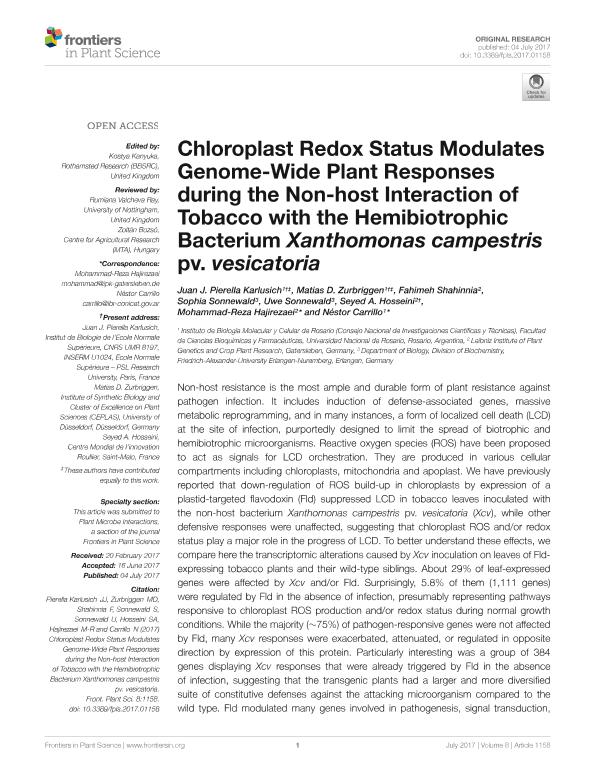Mostrar el registro sencillo del ítem
dc.contributor.author
Pierella Karlusich, Juan José

dc.contributor.author
Zurbriggen, Matias Daniel

dc.contributor.author
Shahinnia, Fahimeh
dc.contributor.author
Sonnewald, Sophia
dc.contributor.author
Sonnewald, Uwe
dc.contributor.author
Hosseini, Seyed A.
dc.contributor.author
Hajirezaei, Mohammad-Reza
dc.contributor.author
Carrillo, Nestor Jose

dc.date.available
2018-07-18T17:55:12Z
dc.date.issued
2017-07
dc.identifier.citation
Pierella Karlusich, Juan José; Zurbriggen, Matias Daniel; Shahinnia, Fahimeh; Sonnewald, Sophia; Sonnewald, Uwe; et al.; Chloroplast redox status modulates genome-wide plant responses during the non-host interaction of Tobacco with the hemibiotrophic bacterium Xanthomonas campestris pv. Vesicatoria; Frontiers Media S.A.; Frontiers in Plant Science; 8; 7-2017; 1-21
dc.identifier.issn
1664-462X
dc.identifier.uri
http://hdl.handle.net/11336/52587
dc.description.abstract
Non-host resistance is the most ample and durable form of plant resistance against pathogen infection. It includes induction of defense-associated genes, massive metabolic reprogramming, and in many instances, a form of localized cell death (LCD) at the site of infection, purportedly designed to limit the spread of biotrophic and hemibiotrophic microorganisms. Reactive oxygen species (ROS) have been proposed to act as signals for LCD orchestration. They are produced in various cellular compartments including chloroplasts, mitochondria and apoplast. We have previously reported that down-regulation of ROS build-up in chloroplasts by expression of a plastid-targeted flavodoxin (Fld) suppressed LCD in tobacco leaves inoculated with the non-host bacterium Xanthomonas campestris pv. vesicatoria (Xcv), while other defensive responses were unaffected, suggesting that chloroplast ROS and/or redox status play a major role in the progress of LCD. To better understand these effects, we compare here the transcriptomic alterations caused by Xcv inoculation on leaves of Fld-expressing tobacco plants and their wild-type siblings. About 29% of leaf-expressed genes were affected by Xcv and/or Fld. Surprisingly, 5.8% of them (1,111 genes) were regulated by Fld in the absence of infection, presumably representing pathways responsive to chloroplast ROS production and/or redox status during normal growth conditions. While the majority (∼75%) of pathogen-responsive genes were not affected by Fld, many Xcv responses were exacerbated, attenuated, or regulated in opposite direction by expression of this protein. Particularly interesting was a group of 384 genes displaying Xcv responses that were already triggered by Fld in the absence of infection, suggesting that the transgenic plants had a larger and more diversified suite of constitutive defenses against the attacking microorganism compared to the wild type. Fld modulated many genes involved in pathogenesis, signal transduction, transcriptional regulation and hormone-based pathways. Remarkable interactions with proteasomal protein degradation were observed. The results provide the first genome-wide, comprehensive picture illustrating the relevance of chloroplast redox status in biotic stress responses.
dc.format
application/pdf
dc.language.iso
eng
dc.publisher
Frontiers Media S.A.
dc.rights
info:eu-repo/semantics/openAccess
dc.rights.uri
https://creativecommons.org/licenses/by-nc-sa/2.5/ar/
dc.subject
Chloroplast Redox Status
dc.subject
Flavodoxin
dc.subject
Localized Cell Death
dc.subject
Plant-Microbe Interactions
dc.subject
Reactive Oxygen Species
dc.subject
Transcriptomics
dc.subject.classification
Otras Ciencias Biológicas

dc.subject.classification
Ciencias Biológicas

dc.subject.classification
CIENCIAS NATURALES Y EXACTAS

dc.title
Chloroplast redox status modulates genome-wide plant responses during the non-host interaction of Tobacco with the hemibiotrophic bacterium Xanthomonas campestris pv. Vesicatoria
dc.type
info:eu-repo/semantics/article
dc.type
info:ar-repo/semantics/artículo
dc.type
info:eu-repo/semantics/publishedVersion
dc.date.updated
2018-06-28T14:05:53Z
dc.journal.volume
8
dc.journal.pagination
1-21
dc.journal.pais
Suiza

dc.journal.ciudad
Lausanne
dc.description.fil
Fil: Pierella Karlusich, Juan José. Consejo Nacional de Investigaciones Científicas y Técnicas. Centro Científico Tecnológico Conicet - Rosario. Instituto de Biología Molecular y Celular de Rosario. Universidad Nacional de Rosario. Facultad de Ciencias Bioquímicas y Farmacéuticas. Instituto de Biología Molecular y Celular de Rosario; Argentina
dc.description.fil
Fil: Zurbriggen, Matias Daniel. Consejo Nacional de Investigaciones Científicas y Técnicas. Centro Científico Tecnológico Conicet - Rosario. Instituto de Biología Molecular y Celular de Rosario. Universidad Nacional de Rosario. Facultad de Ciencias Bioquímicas y Farmacéuticas. Instituto de Biología Molecular y Celular de Rosario; Argentina
dc.description.fil
Fil: Shahinnia, Fahimeh. Leibniz Institute of Plant Genetics and Crop Plant Research; Alemania
dc.description.fil
Fil: Sonnewald, Sophia. Friedrich-Alexander-University Erlangen-Nuremberg; Alemania
dc.description.fil
Fil: Sonnewald, Uwe. Friedrich-Alexander-University Erlangen-Nuremberg; Alemania
dc.description.fil
Fil: Hosseini, Seyed A.. Leibniz Institute of Plant Genetics and Crop Plant Research; Alemania
dc.description.fil
Fil: Hajirezaei, Mohammad-Reza. Leibniz Institute of Plant Genetics and Crop Plant Research; Alemania
dc.description.fil
Fil: Carrillo, Nestor Jose. Consejo Nacional de Investigaciones Científicas y Técnicas. Centro Científico Tecnológico Conicet - Rosario. Instituto de Biología Molecular y Celular de Rosario. Universidad Nacional de Rosario. Facultad de Ciencias Bioquímicas y Farmacéuticas. Instituto de Biología Molecular y Celular de Rosario; Argentina
dc.journal.title
Frontiers in Plant Science
dc.relation.alternativeid
info:eu-repo/semantics/altIdentifier/doi/https://dx.doi.org/10.3389/fpls.2017.01158
dc.relation.alternativeid
info:eu-repo/semantics/altIdentifier/url/https://www.frontiersin.org/articles/10.3389/fpls.2017.01158/full
Archivos asociados
